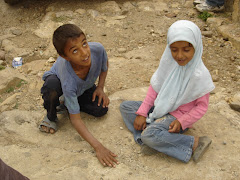
One of the perks of being an underpaid graduate researcher is that you get to sit-in on events hosted by your professors (which usually involves free food). Last week I attended an all-day roundtable on nuclear deterrence, which included my professor Shibley Telhami, but also Thomas Schelling, John Mearscheimer, Stephen Walt, Stephen Van Evera, William Quandt, and lots of other amazing scholars. It was quite an experience to sit around the table with such big names and listen to their exchanges. The roundtable focused on: the credibility of US foreign policy and US deterrence, deterring non-state actors and nuclear proliferation among non-state actors, Iran's nuclear program, and the role of public opinion in deterrence. Most of the conference centered on deterring non-state actors, beginning from the assumption that, since non-state actors have no 'home base' to target in response to an attack they are more difficult to deter. I was pleased that, from the beginning the participants distinguished between Al Qaeda - which can easily be categorized as a terrorist organization, and groups like Hamas and Hizbullah, which not only have national territories that could be targeted in a policy of deterrence, but which are actually legitimate political representatives engaged in resistance operations (and occasionally use terror as a tactic).
Another topic touched on during the roundtable was the decay of the nuclear taboo. One participant pointed out that the rhetoric and weapons-systems projects (the missile defense system) of the Bush Administration has severely damaged the nuclear taboo, which of course affects not only state use of nuclear (or biological or chemical) weapons, but also their use by non-state actors. All states have an interest in maintaining the nuclear taboo - and we cannot condemn other nuclear programs in other states while we ourselves discuss their use in conventional battle-field scenarios and make them increasingly key in European balance of power politics. By contrast, some non-state actors, specifically the most radical groups who want to overhaul ALL of societies norms may be MORE likely to use nuclear weapons because they are outside the bounds of what is accepted by current social norms.
Comments on US credibility were perhaps the most depressing - one participant pointed out that US capacity to create carnage is still widely respected, but that US ability to rebuild or engage in more complex activities is pretty much non-existent. However another participant pointed out (presciently) that most of the actors we are concerned with (the Bin Ladens and opposition movements of the world) were well aware of the failures of empire long before we fudged ours - making reference to earlier comments made by Bin Laden in taped statements pointing out the follies of the Roman Empire, the Soviets in Afghanistan, and the overthrow of colonial governments.
My favorite comment came from a controversial academic - and he basically said "Why the hell are we even talking about nuclear deterrence? What did we do wrong since the fall of the Soviet Union that we are STILL worrying about deterrence." IE - why does everyone want to nuke us? This was the point of the roundtable where everyone nodded their head and resigned themselves to the fact that successive US administrations have made such egregious and arrogant foreign policy decisions that we will most likely be holding this roundtables annually.
